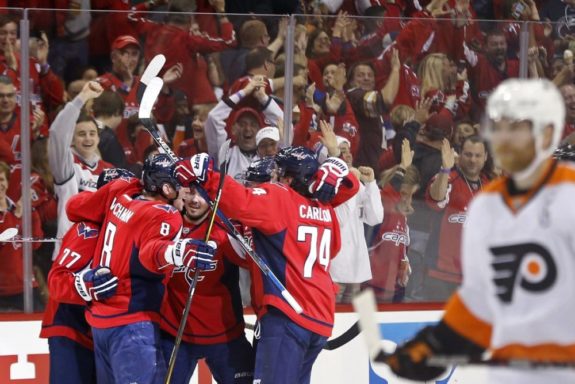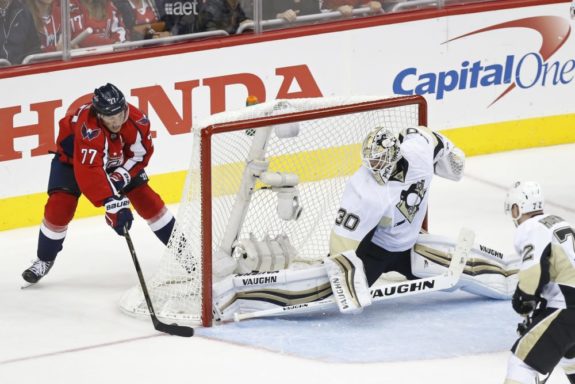The Washington Capitals won their second consecutive President’s Trophy this season with a league-leading 118 points. Heading into the playoffs, it’s hard to look at any other team as the favorite to hoist the Stanley Cup. (By the numbers, that is, because the Caps have yet to prove they have that extra gear to actually reach the Final).
Right behind them are the Pittsburgh Penguins, the defending champions, who according to the media are the Capitals “kryptonite” in the postseason. It’s not really a fair narrative, considering the Caps and Pens have met a total of twice in Crosby/Ovechkin era. Granted, the Pens won both times, but it still is a little exaggerated.
There’s a sense that the Capitals are the superior team in every sense, the most loaded they’ve ever been. But are they really that much better than the Penguins, or even better at all?

The Injury Factor
Although the Penguins didn’t finish first in man-games lost to injury, they topped the league in impact players lost. And they were first in points lost due to injury. The league average was 9.7, Pittsburgh was ranked at 19.9. Conversely, the Capitals were dead last in man-games lost, their freakishly lucky health a big factor in their dominance this season.
Only one player on the Penguins appeared in all 82 games this season, that was Phil Kessel. Their star defenceman Kris Letang played just 41 games this season. All-star Evgeni Malkin suited up for 62 (and still finished second on the team in points). The Capitals on the other hand had seven players play all 82 games, including key guys such as Ovechkin, Nicklas Backstrom, Evgeny Kuznetsov, and Dmitry Orlov.
The only impact player who played less than 70 games was T.J Oshie, who suited up for 68. If the Penguins lost an average of almost 20 points in the standings due to injury, that would have put them ahead of the Capitals, giving them the league’s best record.
By looking solely at numbers, the Capitals were a step ahead. They were far better on the penalty kill, and were better in all defensive categories. They had better goaltending numbers, a better goal differential and allowed fewer goals per game. The Penguins however scored more goals per game, had more shots per game, and more even-strength goals. (The two power-plays were virtually identical).
The question is, were Pittsburgh’s stats skewed by the injuries? Last season, particularly in the playoffs, the Penguins were stifling defensively. They were relentless in their own zone. They rarely if ever gave up the first goal of the game. Their defensive core and goalies have remained in tact, save for the departure of Ben Lovejoy in the offseason.

The Letang Factor
If the reason for the Penguins defensive dip this season was the extended absence of Kris Letang, then it would be expected to carry over into the playoffs. But interestingly, his injury hasn’t seemed to affect their offence. They led the league this season in goals per game, they were third in power-play percentage and fourth in team shooting percentage.
The main concern over Letang’s absence is going to be the Penguins ability to break out of the zone, something that he excelled at. But his defensive impact is clearly just as crucial. The amazing thing about the Penguins is that despite Letang playing just half a season, they finished the year with 50 wins, and 111 points, their highest point total since 1992-93 when a guy named Mario Lemieux was on the team.
There is a lot of skepticism over the Penguins ability to repeat given the absence of Letang, and rightly so, because no one player on their roster will be able to replace him. But are the Penguins not given enough credit for how good they actually are? The Capitals finished with 55 wins and 118 points, which is significantly more than the Pens, but again they did so with a full roster for essentially the entire season.
Numbers don’t tell the whole story, and we’ll never know if the Penguins would have finished with a higher total had they been healthier. But one thing is for certain: if the Penguins are able to get past the Columbus Blue Jackets (fully in tact), they will give the Capitals a run for their money. To finish second overall in the entire NHL losing that many impactful players to injury, what will they do at almost full health?

The Choke Factor
There is a sense that it’s now or never for the Washington Capitals. They will almost assuredly have a different-looking roster next season, and Letang’s injury has appeared to open a door for them in the Eastern Conference. But do the Penguins have a mental edge over the Caps? It’s entirely possible.
There are a lot of factors in Washington’s favour. They will draw the Toronto Maple Leafs in the first round, who despite their talent, can’t seem to stop a beach ball in their own zone. It will be a miracle if the Leafs actually make that a series. The Penguins on the other hand are forced to face the physically intimidating Blue Jackets, and the best goalie in the NHL. The goal will be to get out of that series without any more injuries.
If they manage to get past Columbus, the Caps will be sitting and waiting for them, with their perfect health, and home-ice advantage. Letang’s injury puts the Pens at a clear disadvantage on paper, there’s no doubt about that. But the Capitals would have to beat more than just Pittsburgh in order to advance.
The Capitals under the watch of Alex Ovechkin have never reached the third round of the playoffs despite being a regular season powerhouse. That’s a mental hurdle whether they’d like to admit it or not. And it’s not just the possibility of facing the “rival” Penguins. It’s the fact that the Pens may actually be a better team, and the only other team in the East that can go toe to toe with them.
The Penguins aren’t as formidable without Letang. But for the Capitals to beat them they’ll have to dig deep. Do they have the killer instinct to go all the way? Being able to avoid the Pens altogether could go a long way in determining that.
*All stats courtesy of Man-Games Lost and Sporting Charts*